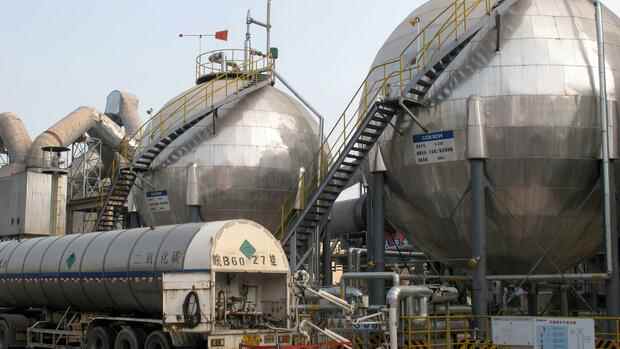China is also developing the technology further in order to make industrial processes less harmful to the climate. So far, there has been skepticism in Germany.
(Photo: Reuters)
Berlin An alliance of industry and climate protectionists is demanding a clear commitment from the next federal government to capture and store CO2 (Carbon Capture and Storage, CCS for short).
The CO2 storage as well as the separation and use of CO2 (Carbon Capture and Utilization, CCU for short) are “central pillars on the way of the industry to climate neutrality”, according to a declaration available to the Handelsblatt.
This is supported by industrial associations such as the Association of Industrial Energy and Power Management (VIK), the Steel Industry Association and the Association of the Chemical Industry (VCI) as well as by the 2 Grad Foundation and Bellona.
Companies that are committed to ambitious climate protection have come together under the umbrella of the 2 Grad Foundation. These include Allianz, Deutsche Bahn, the copper manufacturer Aurubis, Deutsche Wohnen, the energy company EnBW and Heidelberg Cement.
Top jobs of the day
Find the best jobs now and
be notified by email.
Bellona, on the other hand, is an internationally active environmental protection organization with headquarters in Oslo. Bellona has been dealing with CCS for many years. This is no coincidence: the technology has been used in Norway since the 1990s.
This makes the country one of the pioneers when it comes to CCS. Bellona sees technology as an instrument in the fight against global warming that cannot be avoided. “Without CCS, zero emissions cannot be achieved in industry,” said Erika Bellmann, Bellona’s Head of Germany. The federal government should no longer postpone the issue.
WWF open to the topic
Bellona is not the only climate protection organization to speak out in favor of CCS. The WWF has also recently shown itself to be open to the topic. Avoiding emissions is the top priority.
“If that is not possible, it should be checked whether the carbon products created can be used in a climate-friendly manner elsewhere in the sense of a circular economy, or one should consider separating and storing the carbon products,” said WWF in the spring.
It is therefore right “to invest in research and development of CO2 extraction and storage methods today and to gain practical experience”.
In the joint declaration by industry and climate protection activists, the future federal government is called upon to “develop a German CO2 strategy and a regulatory framework for CO2 capture, transport and storage”.
VIK Managing Director Christian Seyfert said that reliable prospects are also necessary for the industrial sectors, which because of their processes have a hard time avoiding emissions entirely. “And that’s CCU and CCS,” he added.
The subject was debated for a long time in Germany. In April 2009 the federal government passed the first draft of a CCS law. It would have enabled the large-scale application of CCS technology in Germany.
Resistance in the population
After the first corporate activities to store CO2 met with great resistance from the population, because leakages and groundwater contamination were feared, the federal government withdrew the law.
A new draft came into force in August 2012 after long debates. The law differs considerably from the draft from 2009. It restricts the technology to demonstration and pilot projects and considerably limits the permissible storage volume.
However, the signs have changed. A decade ago, the critics of CCS technology had argued that CCS primarily serves the purpose of giving coal-fired power plants a chance for survival. In fact, companies like RWE or Vattenfall were among the actors who pushed the topic forward at the time.
But that’s history, the coal phase-out in Germany is a done deal. But CCS remains an issue even without coal-fired power generation. Because in Germany alone, around 60 million tons of so-called process-related CO2 emissions are generated in industry every year, which can only be saved if the corresponding production is stopped.
CCS is the method of choice for process-related emissions. This is undisputed among climate researchers. The Intergovernmental Panel on Climate Change (IPCC) has repeatedly pointed out in recent years that climate neutrality can only be achieved if all available means of CO2 reduction are used, including CCS.
If the Greens are involved in the next federal government, the prospects for CCS projects are bad. The party is skeptical about the issue. Specialist politicians of the Green parliamentary groups did not want to comment on Wednesday at the request of the Handelsblatt.
More: Why climate protection agreements could be the steel industry’s last chance
